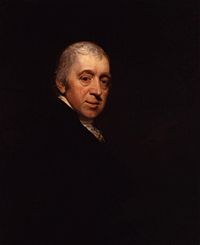Henry Phipps, 1st Earl of Mulgrave facts for kids
Quick facts for kids
General The Right Honourable
The Earl of Mulgrave
|
|
|---|---|
 |
|
| Secretary of State for Foreign Affairs | |
| In office 11 January 1805 – 7 February 1806 |
|
| Monarch | George III |
| Prime Minister | William Pitt the Younger |
| Preceded by | The Lord Harrowby |
| Succeeded by | Charles James Fox |
| Chancellor of the Duchy of Lancaster | |
| In office 6 June 1804 – 14 January 1805 |
|
| Monarch | George III |
| Prime Minister | William Pitt the Younger |
| Preceded by | The Lord Pelham |
| Succeeded by | Lord Hobart |
| Personal details | |
| Born | 14 February 1755 |
| Died | 7 April 1831 (aged 76) |
| Nationality | British |
| Political party | Tory |
| Spouse |
Martha Sophia Maling
(m. 1795) |
| Children |
|
| Parents |
|
| Relatives | James II of England (great-great-grandfather) |
| Alma mater | |
Henry Phipps, 1st Earl of Mulgrave (born 14 February 1755, died 7 April 1831) was an important British soldier and politician. He was known as The Honourable Henry Phipps until 1792, and then as The Lord Mulgrave from 1792 to 1812. One of his most notable roles was serving as the Foreign Secretary (the person in charge of dealing with other countries) for Prime Minister William Pitt the Younger from 1805 to 1806.
Contents
Early Life and Education
Henry Phipps was born into a well-known family. His father was Constantine Phipps, 1st Baron Mulgrave. His mother was the Honourable Lepell, daughter of John Hervey, 2nd Baron Hervey. Henry went to Eton College, a famous school, and later studied law at the Middle Temple.
Military Career
Henry Phipps joined the army in 1775. He eventually became a General, which is a very high rank. He fought in the American Revolutionary War in the Caribbean.
In 1793, he became the Colonel of the 31st (Huntingdonshire) Regiment of Foot. That same year, he was on a special mission in Turin, Italy. This meant he was nearby when British forces captured the French port of Toulon. He briefly led the British ground forces there.
Later, in 1799, he went on another military mission. He tried to convince the Austrian commander, Archduke Charles, to keep his troops in Switzerland. However, he was not successful in this effort.
Political Career
In 1784, Henry Phipps became a member of the House of Commons for Totnes. He supported the government led by William Pitt the Younger, and they became good friends. In 1790, he was elected to represent Scarborough.
When his brother, Constantine Phipps, 2nd Baron Mulgrave, passed away in 1792, Henry became Baron Mulgrave in the Peerage of Ireland. This was a noble title. In 1794, he received a British peerage, also as Baron Mulgrave, which allowed him to join the House of Lords. In 1796, he was made Governor of Scarborough Castle.
Working with William Pitt
Henry Phipps remained loyal to William Pitt. When Pitt resigned in 1801, Phipps continued to support him. Because of his loyalty, he was given the job of Chancellor of the Duchy of Lancaster from 1804 to 1805 in Pitt's second government.
After another official, Lord Harrowby, had an accident, Henry Phipps took his place as Foreign Secretary. In this role, he helped Pitt create the Third Coalition. This was a group of European countries that joined together against Napoleon.
Later Political Roles
After Pitt's death in 1806, Henry Phipps and other supporters of Pitt were no longer in power. However, when Pitt's friends returned to power in 1807, Phipps held several important positions:
- First Lord of the Admiralty (1807–1810): This role involved leading the British Navy. He helped plan successful missions, like the one against Copenhagen in 1807.
- Master-General of the Ordnance (1810–1819): This job was about managing military supplies and weapons.
- Minister without Portfolio (1819–1820): This meant he was a minister without a specific department.
In 1812, he was given even higher titles: Viscount Normanby and Earl of Mulgrave in the Peerage of the United Kingdom.
Family Life
Henry Phipps married Martha Sophia Maling in 1795. She was the daughter of a pottery maker. They had several children:
- Constantine Phipps, 1st Marquess of Normanby: Their eldest son, who later became a Marquess.
- Sir Charles Beaumont Phipps: Their second son.
- Edmund Phipps: Their third son, who became a lawyer and writer.
- Augustus Frederick Phipps: Their fourth son, who became a church official.
- Five daughters: Only one of them lived past childhood.
Henry Phipps passed away in April 1831 at the age of 76. His wife, Martha Sophia, the Countess of Mulgrave, died in 1849.
See also
- Ramsay Weston Phipps
 | Sharif Bey |
 | Hale Woodruff |
 | Richmond Barthé |
 | Purvis Young |

